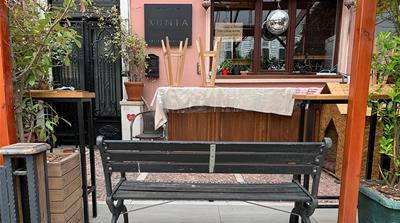‘Adapt or die’: Turkey restaurants rise to coronavirus challenge
Istanbul’s restaurants, bars and cafes had just started to recover. Then COVID-19 hit them with a new setback.

Istanbul, Turkey- Tucked away in Istanbul’s charming Asmalı Mescit neighbourhood, German-Turkish Chef Cem Eksi would normally be plating up colourful, modern Mediterranean dishes in his intimate 15-seater bistro, Mabou.
But coronavirus restrictions have forced him to do away with his planned spring menu and rethink his entire approach.
Keep reading
list of 4 itemsMexico’s teachers seek relief from pandemic-era spike in school robberies
‘A bad chapter’: Tracing the origins of Ecuador’s rise in gang violence
Why is the US economy so resilient?
“I completely changed everything, I’m now making pasta and bread and sending it out to be delivered on a motorcycle,” he says.
Eksi, who began his career in a three-Michelin-starred restaurant in Germany, says there is no time for having an ego in an environment where you either “adapt or die”.
With spring unfolding in earnest, many of Istanbul’s hotspots are no longer the hive of activity they once were, thanks to coronavirus restrictions that have left Turkey’s most populous city eerily subdued.
Turkey has more than 138,000 confirmed cases of COVID-19 and the death toll from the disease is approaching 3,800 according to Johns Hopkins University.
The country’s bars were forced to shut their doors to customers on March 16, and some restaurants and cafes the following day. This left many restaurateurs scrambling to adjust to the new normal.
The shutdowns are a significant setback for an industry already hampered by inflation and a weakening lira. Many of these businesses were just starting to reap the benefits of a strong rebound in tourism. It is now unclear how many of them will survive.

Feeling the heat
“I’m working three times more and earning about 70 percent of what I earned before,” says Eksi. “This is enough to not have to shut the restaurant, we are lucky that we can go on. Thankfully, I managed to change the concept early.”
With his suppliers no longer operating, he has had to get creative. Eksi sources ingredients directly from farmers and finds what he can in local supermarkets. He pulls together a menu and sends it out to his customers each Sunday via Whatsapp.
A recent menu offered white asparagus and house-smoked trout, cauliflower rosemary soup, chanterelles and cream pasta sauce, freshly baked spelt wheat sourdough and strawberry tarts.
“When we designed our delivery menu, I had to think about what I could cook fast and what would travel well. I tried to keep the same style and flavour as before. Sadly, what I can’t deliver is ambience or good conversation. I think that’s what makes us special.”
The revenue he is generating at the moment through his delivery service is enough to keep his head above water: “I am now earning enough to pay my employees, my rent and taxes,” he said.
Across town, coffee-shop owner Emre spoke to Al Jazeera under a pseudonym.
“At the moment it’s not profitable, but I can survive. I expected this to be a record profit-making summer,” says the 35-year-old who left his career in engineering in 2017 to pursue his passion of running an artisanal cafe in the cobblestone backstreets of a seaside suburb.
Emre has been able to keep his business afloat by circumventing the ban. “This is a small neighbourhood. I know the guys who work for the police and the municipality. They trust I will take precautions and obey hygiene rules, so we have an agreement.”
Even with this arrangement, he said his daily sales are down 70 percent because dining habits are changing.
“Before people could sit and have a second or a third coffee. Everyone is careful now, they just grab one and go. There is no time for extra consumption,” he said.
“Plus, we can’t serve food any more, that was 30 percent of my revenue”, Emre gestures to empty cabinets which are usually filled with cake and biscuits.
Just before the shutdown came into effect, Emre had roasted 100 kilograms (220 pounds) of coffee beans: “If I had shut down the cafe, all of it would have gone stale and I would have wasted about 15,000 liras- [$2,112] worth of beans.”
Shaky ground
“The industry has been hit hard by the COVID-19 outbreak,” says Arda Tunca, an economist based in Istanbul.
Turkey had recently emerged from recession, when the coronavirus pandemic struck, pushing it back towards a second downturn in less than two years. Depleting foreign exchange reserves and high external debt costs have piled pressure on the lira, that hit a record low last week, awakening comparisons to the of the currency crisis that roiled the country back in 2018.
For Emre, a weakening currency raises his cost of doing business.
“We buy everything with euros. Beans, machinery, everything. When I first opened, it was about 4 liras [$0.56] to the euro, right now it’s about 7.6 [$1.07]. In the last two months, the price of beans has gone up about 15 percent.”
But he does not want to pass those costs on to customers by raising his prices.
“Everyone is price-sensitive. It’s killing the service industry, we were already walking a fine line and the coronavirus has pushed us even closer to the edge,” he said.
The food-service sector in Istanbul is heavily dependent on tourism, an industry that had started to make a comeback after a spate of violent attacks in 2015 and 2016.
Turkey drew more than 50 million tourists in 2019. But the coronavirus and travel restrictions are reversing those gains. The number of visitors to Turkey fell 67.83 percent in March 2020, compared with the same month last year.
“The food-service industry is going to contract domestically due to the fact that tourism is totally dead at the moment,” said Tunca, adding that though out-of-home food and beverage market represents roughly 2 percent of the country’s economy, “it’s an important source of job creation for the young generation. Youth unemployment is already around 28 percent in Turkey.”
Moreover, it is unlikely the restaurant business will get much in the form of state aid to weather the negative shocks from the pandemic.
“There have been certain tax breaks and unemployment benefits introduced, but there isn’t any specific or special support function for them,” said Tunca.
Everyone is price sensitive
Socially-distant future
On May 4, Turkish President Recep Tayyip Erdogan announced plans to ease social-distancing restrictions and reopen certain businesses. On Monday, the government said restaurants that abide by new health and hygiene rules can open their doors to customers on May 27.
But even in a post-lockdown world, Emre predicts that the coronavirus will have “long-lasting” effects on the industry.
“This was a real meeting point for the community. I’m worried the behaviours of my customers might change. Perhaps people won’t want to sit close to each other when this is all over,” he said. “Many people will lose their jobs, perhaps they’ll spend less on coffee.”
Chef Eksi has similar concerns.
“Having a small restaurant like mine will be a big problem, especially if the government mandates that tables need to be a certain distance apart.”
For Eksi, it could mean shaking things up again.
“I’m thinking about changing the restaurant into something different, maybe some kind of charcuterie and wine bar. We’ll see what time will bring.”